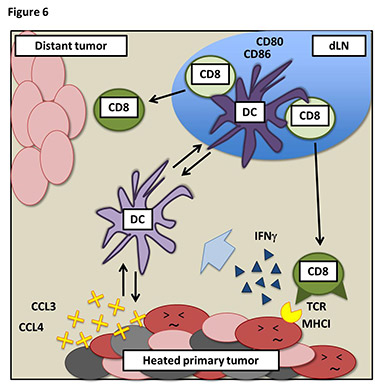Dartmouth Researchers Find Promising Results with Local Hyperthermia of Tumors
A combination of iron-oxide nanoparticles and an alternating magnetic field, which together generate heat, have activated an immune system response to tumors in mice according to an accepted manuscript by Dartmouth-Hitchcock Norris Cotton Center researchers in the journal Nanomedicine: Nanotechnology, Biology and Medicine released online on February 24, 2014.
"The study demonstrates that controlled heating of one tumor can stimulate an immune response that attacks another tumor that has not had the heat treatment," said Steve Fiering, PhD, Norris Cotton Cancer Center researcher and professor of Microbiology and Immunology, and of Genetics at the Geisel School of Medicine at Dartmouth. "This is one way to try to train the immune system to attack metastatic tumors that may not be recognized yet."
Researchers injected iron-oxide nanoparticles into the tumor and then activated those agents with magnetic energy. Researchers were able to activate antigen-presenting dendritic cells in the body's immune system. Dendritic cells somewhat serve as "quarterbacks" for body's immune system by calling for quick coordinated protection against an attack. The "quarterback" cells show the defensive "killer" T cells (CD8+ cells) who to attack and these cells then directly attack tumor cells and send out an alert system to engage other cells in the fight against the cancer. The combination of these two aspects of the immune response reduce risk of recurrence and discourage spreading or metastasis of the cancer. This result was observed in sites close to the primary tumor as well as distant sites. In the experiments conducted as part of this study the primary tumor resisted regrowth for one month following overheating.
The magnetic hyperthermia system used was developed by co-author P. Jack Hoopes, DVM, PhD co-director of Norris Cotton Cancer Center's Nanotechnology Working Group. "It enables very precise control of the heating to keep the temperature at a uniform 43 degrees C for as long as desired," said Fiering. "This precise control was the key to optimal immune stimulation."
The experiment included mouse colon and, melanoma cancers. Tumors responded to the heat by growing more slowly or disappearing completely. A higher temperature was better at eliminating primary tumors that were heat treated, but did not activate the immune system as well to find and attack metastatic tumors. Treatment of larger primary tumors generated a stronger immune response.
 Mechanism of anti-tumor immune resistance induced by local hyperthermia treatment
Mechanism of anti-tumor immune resistance induced by local hyperthermia treatment
In the effort to develop better cancer treatments, the challenge is to find ways to cure metastatic disease. "The use of the immune system through cancer immunotherapy is a very exciting field currently and promises to contribute significantly to elimination of metastatic tumors," said Fiering. "The approach demonstrated is a good new option to be combined with other immunotherapy strategies for cancer therapy."
Standard cancer care involves surgery, but surgeons have few tools to guarantee the removal of every cancer cell, especially when there is unrecognized metastases in other anatomic locations. An approach like local hyperthermia one day might be used to kick start the immune system to ward off any cancer cells not removed by surgery to increase the chances of treatment success.
The study was funded by NIH Grant # 1 U54 CA151662 and NIGMS P20 RR15639.
About Norris Cotton Cancer Center at Dartmouth-Hitchcock
Dartmouth has been designated as a Center of Cancer Nanotechnology Excellence (CCNE) with a five-year, $12.8 million grant from the National Cancer Institute (NCI). The CCNE places Dartmouth among top centers in cancer nanotechnology research nationwide and takes full advantage of Dartmouth's culture of cross-disciplinary collaboration. CCNEs are tasked with integrating nanotechnology into basic and applied cancer research in order to provide new solutions for the diagnosis and treatment of cancer.
Norris Cotton Cancer Center combines advanced cancer research at Dartmouth and the Geisel School of Medicine with patient-centered cancer care provided at Dartmouth-Hitchcock Medical Center, at Dartmouth-Hitchcock regional locations in Manchester, Nashua, and Keene, NH, and St. Johnsbury, VT, and at 12 partner hospitals throughout New Hampshire and Vermont. It is one of 41 centers nationwide to earn the National Cancer Institute's "Comprehensive Cancer Center" designation. Learn more about Norris Cotton Cancer Center research, programs, and clinical trials online at cancer.dartmouth.edu.
Norris Cotton Cancer Center; Feb. 28, 2014
--------------------------
---------------------------
